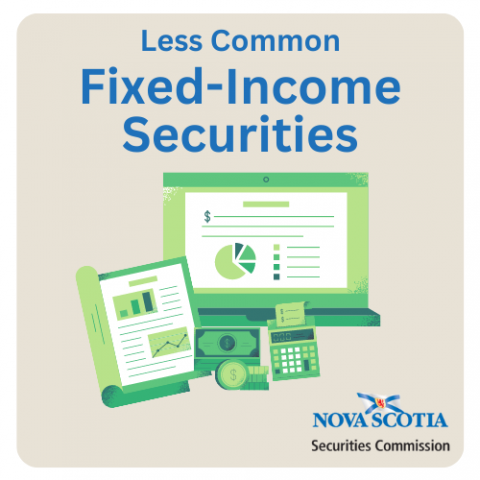Submitted by nsscadmin on

For the next two weeks in February we’re going to be taking a closer look at fixed-income securities. A fixed-income security is an investment that delivers a return in the form of fixed periodic interest payments and the eventual return of the principal investment at maturity. You may be familiar with a few types of fixed-income securities such as bonds, or guaranteed investment certificates (GICs). This post will look at a few fixed-income securities that are less common that you may not be as familiar with or may have not heard of at all.
Treasury Bills (T-Bills)
T-Bills are short-term debt instruments that are issued by the government, both Federal and provincial in Canada. T-Bills have a maximum term of one year, but are also issued with terms of 30, 60, or 90 days, or six months. They are highly liquid and typically sold at any time.
T-Bill’s pay their returns through interest, but investors do not receive periodic interest payments. Investors purchase T-Bills at a discounted rate and receive its face value upon maturity. The face value is made up of both principal and interest. For example, an investor purchases T-Bill with a face value of $1,000 for $900. When the T-Bill reaches maturity, the investor can receive $1,000. These numbers are just an example, and do not reflect the real value or potential returns of a T-Bill.
T-Bills are considered low risk investments, with the assumption that there is very little chance the government will default on them. One type of risk with a T-Bill is interest rate risk. As the interest rate is fixed and if rates rise you could be making less than the current interest rate from your investment. However, due to the short-term nature of T-Bills even the interest rate risk is low.
Banker's Acceptances (BAs)
BAs may soon cease to exist following the cessation of the Canadian Dollar Offer Rate, but until they are officially retired investors should know about them. BAs are also short-term debt instruments that are similar to T-Bills. As the name suggests BAs are issued by banks instead of a government as with T-Bills. BAs are created by a borrower for payment on a specified future date. BAs are guaranteed at maturity by banks and offer a low level of risk for short-term investors.
BAs are typically issued with one-to-three-month terms and are highly liquid. BAs tend to offer a slightly higher rate than T-Bills due to lower credit scores given to them. The initial investment needed to purchase BAs also tends to be higher than the initial investment needed to purchase T-Bills.
Mortgage-backed securities
Mortgage-backed securities are another type of debt instrument. These investments are backed by pools of insured mortgages. Investors who invest in these pools receive payments made up of monthly interest and principal payments. By purchasing mortgage-backed securities you are essentially purchasing someone else’s debt and you receive returns when they make payments on that debt.
The term lengths on mortgage-backed securities are typically between one to 10 years with initial investment limits usually starting at around $5,000. There is risk in this type of investment but it has been lessened due to the fact that payments are guaranteed by the Canda Mortgage Housing Corporation.
The Nova Scotia Securities Commission does not provide investment advice. We are not advising or recommending the use of any of these fixed-income securities. This post is simply to educate investors on these securities to let them know they exist and how they work. An investor should work with their adviser to determine if these products are suitable for them and their financial situation and goals.
